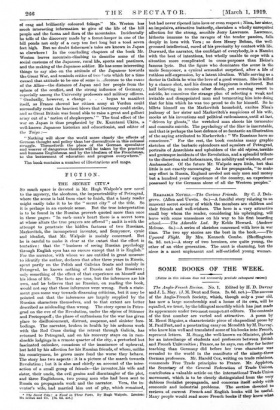FICTION.
THE SECRET CITY.• So much space is devoted in Mr. Hugh Walpole's new novel to the mystery, the aloofness, the impenetrability of Petrograd, where the scene is laid from start to finieh, that a hasty reader might easily take it to be the "secret city" of the title. So it is perhaps in an exoteric sense. But the true interpretation is to be found in the Russian proverb quoted more than once in these pages: "In each- man's heart there is a secret town at whose altars the true prayers are offered" ; andit is with the attempt to penetrate the hidden fastness of two Russians, Markovitch, the incompetent inventor, and Semyonov, cynic and idealist, that Mr. Walpole is mainly concerned. But he is careful to make it clear at the cutest that the effort is tentative : that the "business of seeing Russian psychology through English eyes has no excuse except that it is English." For the narrator, with whom we are entitled in great measure to identify the author, declares that after three years in Russia, spent partly on the Polish and Galician fronts and mainly in Petrogrsd, he knows nothing of Russia and the Russians ; only something of the effect of that experience on himself and his ideas of life. The facts are true, but the inferences are his own, and be believes that no Russian, on reading the book, would not say that those inferences were wrong. Such a state. ment goes some way towards disarming criticism, but it may be pointed out that the inferences are largely supplied by the Russian characters themselves, and to that extent are better described as misleading than wrong. The story opens in Petro- grad on the eve of the Revolution, under the regime of Stermer and Protopopoft ; the phase of enthusiasm for the war has given place to disillusionment, distrust, suspense, and sinister fore- bodings. The narrator, broken in health by his arduous work with the Red Cross during the retreat through Galicia, has returned to Petrograd, and on his recovery stays on in ram- shackle lodgings in a remote quarter of the city, a perturbed but fascinated onlooker, conscious of the imminence of upheaval, but held by his affection for his Russian friends, of whom, unlike his countrymen, be grows more fond the worse they behave. The story has two aspects : it is a picture of the march towards Revolution ; but it is also and chiefly an account of the inter- action of a small group of friends—the inventor, his wife and sister, their unole, the evil genius and disentangler of the plot, and three Englishmen, two young men who had been sent to Russia on propaganda work and the narrator. Vera, the in- ventor's wife, had married him out of pity, which remained,
• The Secret Oily : a Novi in Three Pert,. By Rash Walpole. London: Na.mIllas sad Co. [7s. eel. net.]
but bad never ripened into love or even respect ; Nina, her sister, an impulsive, attractive butterfly, cherishes a wholly unrequited affection for the strong, sensible Jerry Lawrence. Lawrence, hitherto immune to the ravages of the tender passion, falls deeply in love with Vera ; so does Henry Bohun, the well. groomed intellectual, cured of his preciosity by contact with life. Durward, the narrator, the confidant of everybody, is a Hamlet with the beet of intentions, but wholly unable to cope with a situation more complicated in cross-purposes than Heine's famous lyric. But the figure who dominates the scene is the uncle Semyonov, a cynical sensualist surprised, after a life of ruthless self-expression, by a latent idealism. While serving as a doctor in Galicia he sins the love of a good woman. She is killed by a chance shot, and his dream of happiness is shattered. But half believing in reunion after death, yet scorning resort to suicide, he conceives the strange plan of selecting a weak and irritable and disappointed man and tormenting him into doing that for him which he was too proud to do for himself. So he billets himself ou the Markovitch household, excites Nines jealousy of her sister and Markovitch's suspicions of his wife, mocks at his inventions and political enthusiasms,until at last, "driven by ghosts," the wretched man shoots his tormentor and commits suicide. The psychology of the Slav is inscrutable, and that is perhaps the beet defence of so fantastic: an illustration of the saying attributed to Markovitch " We Russians have no conscience." For the rest, the book contains many graphic sketches of the barbaric splendours and squalors of Petrograd, portraits of Anarchists and upholders of the old regime, terrible and grotesque incidents of the Revolution, and a splendid tribute to the discretion and forbearance, the nobility and wisdom, of our Ambassador. Of the future Mr. Walpole says little, but that little is not exactly encouraging As for propaganda, "to make any effect in Russia, England needed not only men and money but a hundred years' experience of the Country, an experience possessed by the Germans alone of all the Western peoples."


































 Previous page
Previous page